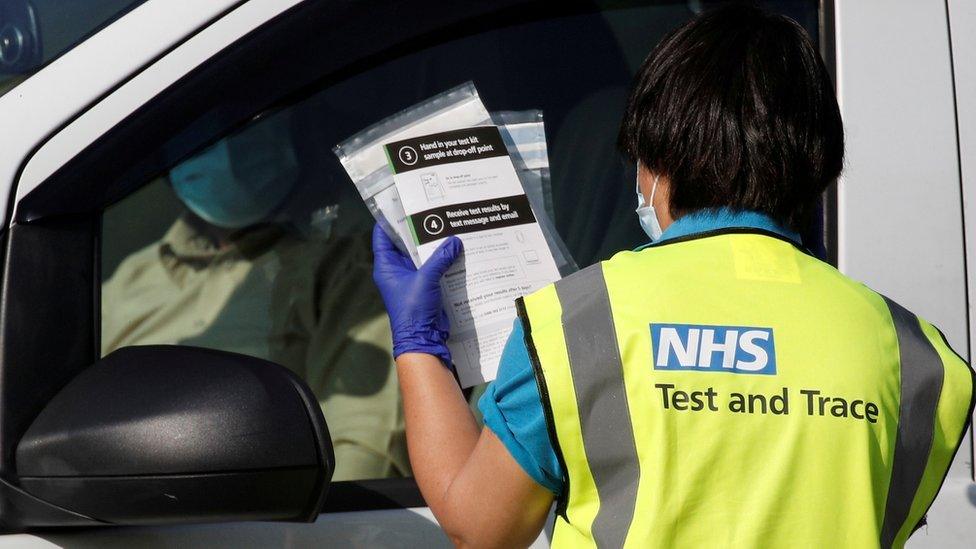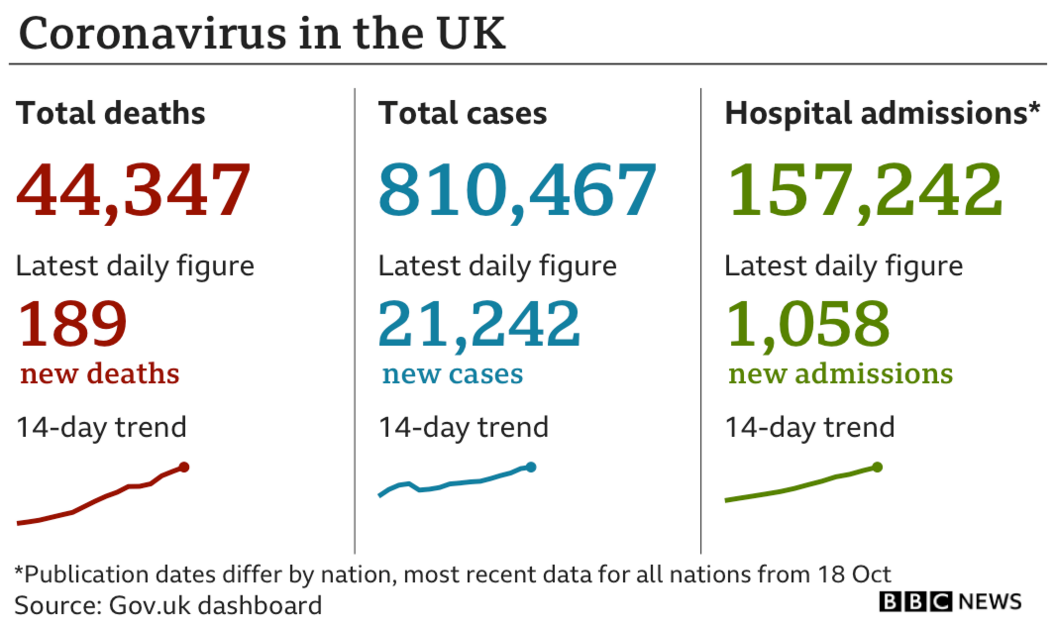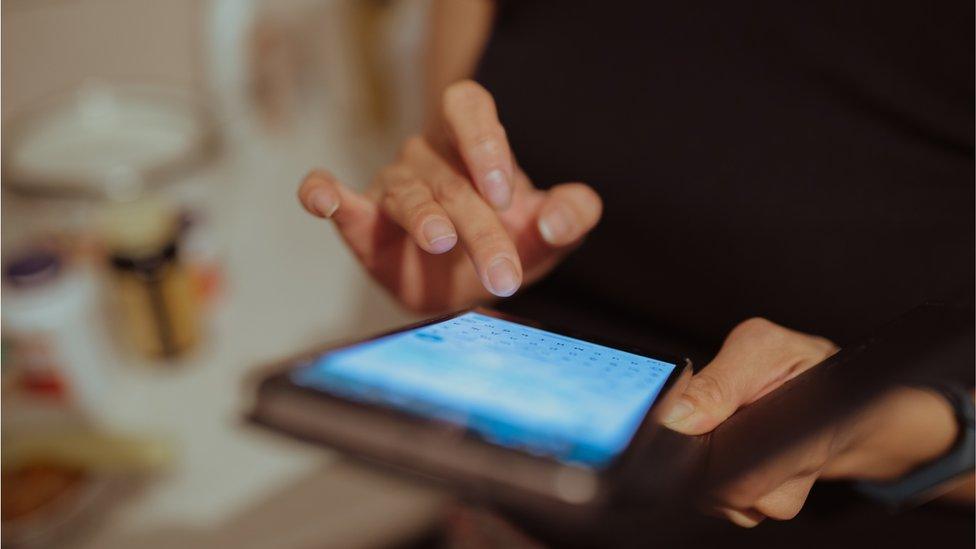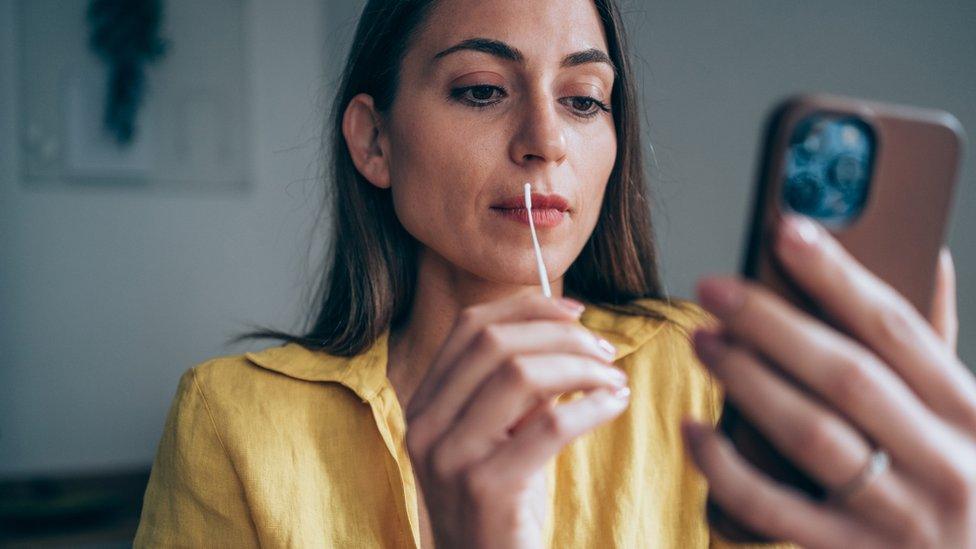Covid: NHS Test and Trace needs to improve, PM concedes
- Published
- comments
Boris Johnson: "We do need to see faster turnaround times"
England's NHS Test and Trace system needs to improve to provide faster results, Boris Johnson has conceded.
At Thursday's coronavirus briefing, he said he shared "people's frustrations" at the turnaround times for results.
The government's chief scientific adviser, Sir Patrick Vallance, said it was "very clear there's room for improvement" in the system.
It comes as figures showed just 15.1% of people who were tested received their result within 24 hours.
These figures, for the week ending 14 October, are the lowest since the system began.
The PM previously pledged that all tests would be processed within 24 hours - unless there were issues with postal tests - by the end of June.
Speaking at a press conference at Downing Street, Mr Johnson said: "I share people's frustrations and I understand totally why we do need to see faster turnaround times and we need to improve it.
"We need to make sure that people who do get a positive test self-isolate - that's absolutely crucial if this thing is going to work in the way that it can."
Chief scientific adviser Sir Patrick Vallance says there is "room for improvement" in test and trace
Sir Patrick Vallance said the capacity for testing had increased, but "it's really important to concentrate on numbers of contacts, isolation, as quickly as you can and getting things (results) back as quickly as you can. Ideally you get the whole process done within 48 hours".
"It's very clear there's room for improvement on all that and therefore that could be diminishing the effectiveness of this."
He also said the the high number of infections diminished the effectiveness of the system.

The percentage of people who received a test result within 24 hours has dropped from 32.8% in the previous week.
The figures also showed a fall to 59.6% in the proportion of close contacts reached of people who tested positive.
This is also the lowest weekly percentage since the system began and is down from 63% in the previous week.
The UK recorded, external another 21,242 cases on Thursday and 189 more deaths within 28 days of a positive test.

Sir Patrick also told the briefing some coronavirus measures would be needed for some time to come.
"The numbers (of cases) speak for themselves. They are increasing and they are not going to decrease quickly," he told the No 10 news conference.
"I think it is likely that some measures of restriction are going to need to be in place for a while to try and get those numbers down."
Sir Patrick added that "a lot depends now on what happens over the next few weeks".
"At the moment, the numbers are heading in the wrong direction but there are some signs in some places of a potential flattening off of that.
"We need to wait and see and monitor the numbers very carefully."
Earlier the government released a job advert looking for a "VP of operations" to start immediately, with experience of "turning around failing call centres" on a day rate of up to £2,000.
Hours later, the Department of Health withdrew the advert, saying it was being redrafted and the text had not been approved.
Shadow health secretary Jonathan Ashworth said the statistics on test and trace "have been bad every week", while his colleague, shadow health minister, Justin Madders said: "To have over 40% of people not even being contacted by the test and trace system is an interstellar-sized black hole in the government's plan to reduce transmission."
Prof James Naismith, director of the Rosalind Franklin Institute at the University of Oxford, said the numbers showed "a system struggling to make any difference to the epidemic".
He said he worried the increasing percentage of household contacts indicated "a tick-box system rather than proper tracing" with the value of the system being in reaching non-household contacts who are infectious but asymptomatic.
Mr Naismith added the system "has given a bird's eye view of the pandemic and done very little to halt it".
In other developments:

EASY STEPS: How to keep safe
A SIMPLE GUIDE: What are the symptoms?
GETTING READY: How prepared is the UK?
TRAVEL PLANS: What are your rights?
IN-DEPTH: Coronavirus pandemic

- Published22 October 2020

- Published20 October 2020

- Published3 May 2022

- Published5 August 2021
